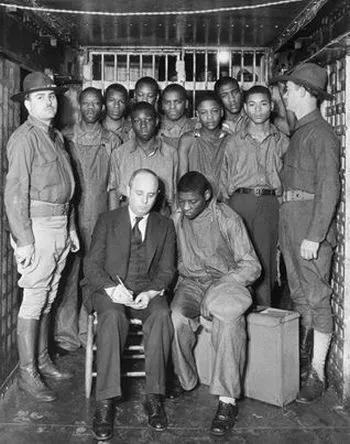
Florida State Prison photographs of Clarence Earl Gideon in 1961. Credit: State Archives of Florida.
Clarence Earl Gideon, a Florida drifter who spent time in and out of prisons for nonviolent crimes, was an unlikely individual to help redefine a criminal defendant’s right to counsel 60 years ago in the Supreme Court case Gideon v. Wainwright.
After being accused of committing felony breaking and entering of a pool hall, the indigent Gideon petitioned the Florida state court to provide him with an attorney free of charge. The judge denied his request, and despite Gideon’s attempt to represent himself, the jury ultimately found him guilty.
From prison, Gideon wrote a letter to the U.S. Supreme Court, which heard his case and decided that indigent defendants are entitled to counsel in state criminal trials. Gideon was retried in Florida state court – this time with an appointed lawyer – and found not guilty.
“The promise of the Gideon decision is increasingly important today as we struggle with the widening poverty gap, systemic racism, and unchecked prosecutorial overreach,” said Melody Brannon, federal public defender for the District of Kansas.
The right to appointed counsel had existed in federal criminal cases since the 1930s. But because the Gideon decision reached the much larger universe of state court defendants, it is still recognized as pivotal in making legal representation a reality for defendants accused of serious crimes. Public Defense Week and National Public Defender Day, which occur March 18, commemorate the landmark case and the vital work of public defense lawyers.
“The right to counsel has been a fundamental part of the Constitution since its adoption, and public defense attorneys are critical to ensuring that everyone receives adequate representation in our system of justice,” said U.S. District Judge Micaela Alvarez, chair of the Judicial Conference's Defender Services Committee. “The Gideon case remains significant today because it established that no one could pick and choose who is and isn’t worthy of having the right to counsel because of the size of their wallet.”
In addition to its impact on state courts, Gideon opened a period of intense activity to ensure competent counsel for federal defendants. In 1964, a year after the Gideon ruling, Congress passed the Criminal Justice Act (CJA), which provides funding for court-appointed counsel in federal cases. Today, nearly 90 percent of federal criminal defendants are aided by lawyers, investigators and experts paid for under the Criminal Justice Act.
Many defenders and judges call the CJA a shining success. “It's been called the gold standard of public defense,” Catherine C. Blake, then-chair of the Defender Services Committee, said in 2014, in recognition of the 50th anniversary of the CJA. “The Criminal Justice Act and the right to counsel have greatly strengthened the fairness and integrity of our system of justice.”

A 1931 Alabama rape case led the Supreme Court to declare, a year later, that failure to appoint counsel could violate the Constitution.
Carlos Williams, executive director of Southern District of Alabama Federal Defenders, Inc., a nonprofit organization that defends clients in the district, cited Powell v. Alabama to capture the critical work of public defense lawyers in our criminal justice system. The 1932 Supreme Court decision helped set the stage for a right to counsel in all felony cases.
“Even the intelligent and educated layman," Justice George Sutherland wrote, “requires the guiding hand of counsel at every step in the proceedings against him. Without it, though he be not guilty, he faces the danger of conviction because he does not know how to establish his innocence.”
Williams said, “Toughened sentencing laws have made a robust public defense more critical than ever.”
The Judiciary’s Defender Services Office is committed to protecting the right to counsel and works to even the courtroom odds through continuing education, training, and support for defenders and panel attorneys across the country. The Judiciary has also taken several steps toward implementing the interim recommendations of the Ad Hoc Committee to Review the CJA, also known as the Cardone Report.
“We honor the Gideon decision by striving for a robust and institutionally sound system of public defense,” Brannon said. “In the federal system, that means implementing recommendations in the Cardone Report, sufficient defense funding — for defenders and panel attorneys — in parity with the prosecution, and a voice in judicial policy decisions. Budgets and policy are moral documents, and how we invest in public defense reflects our system’s moral valuation of equal justice for all.”
Visit the Sixth Amendment Activities page to learn more about the right to counsel.
Subscribe to News Updates
Subscribe to be notified when the news section is updated.
